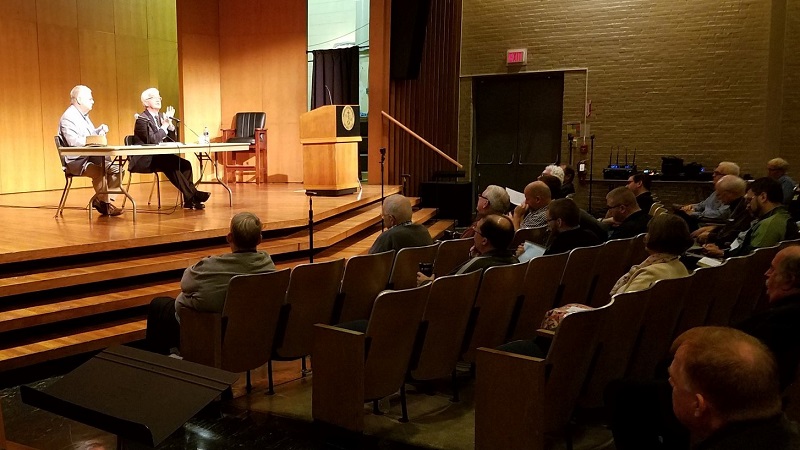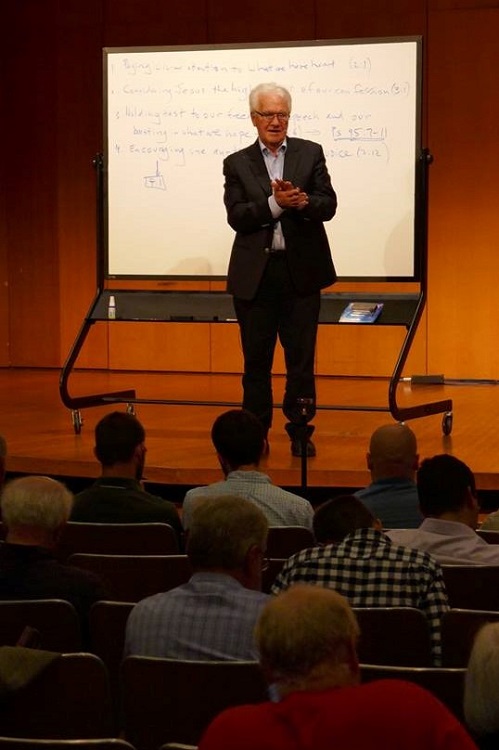Author of the Concordia Commentaries on Leviticus and Hebrews, Dr. John Kleinig from the Lutheran Church of Australia has been on campus this week to teach a Continuing Education course on the Theology of Worship in Hebrews. There was a standing invitation for students to drop in as their schedules permitted, plus a special convocation hour this morning on Hermann Sasse.

Rev. Sasse is considered one of the foremost Lutheran theologians of the 20th century, having survived Nazism through the 1930s and 40s, despite living in Germany as a very loud and active voice of dissent against the Nazi party. “It was a miracle—a number of miracles—that he wasn’t killed,” Dr. Kleinig said. He went on to explain that Sasse had been an officer in WWI and still had a number of friends among the German army. He was a marked man, but the Nazi party couldn’t touch him without getting into trouble with the army, who already had a tenuous relationship with Hitler. Professor Sasse later served as liaison for the de-Nazification of the University in Bavaria before accepting a call to teach at Luther Seminary in North Adelaide, Australia, in 1949.
Dr. Kleinig studied under Sasse at Luther Seminary in the 60s, and the convocation was a chance to hear him reminisce and tell stories of his time learning under the theologian. “He was a truth-sayer,” Dr. Kleinig recalled. “Very warm and wickedly witty. He made friends with people easily but inevitably he would fall out with them because he always told the truth. And he could be devastating with his one-liners. But even though he was a truth-sayer, he was very generous in his appraisals. He was always inclined to see what was good instead of the bad.”
One of Dr. Kleinig’s classmates once began a question to the professor with, “This may be a stupid question, but…” but Sasse simply said, “Mister—” he always called the students Mr. and their last name, Dr. Kleinig explained “—only stupid people don’t ask questions.” And he had a gift for finding something profound to say about every question.
His students took it as a challenge. One day during class a student said to him, “So I have a girlfriend.”
“Good, good,” the professor replied.
“And we go to church together.”
“Even better.”
“As we sit in the pew together…are we allowed to hold hands in church?”
And Professor Sasse immediately cried out in a fierce voice, “It would be very, very wrong…NOT to hold her hand.”
“It was the only time he answered a question with a single sentence,” Dr. Kleinig recalled fondly.
Besides telling a number of other stories about his old professor, Dr. Kleinig explained why he was still worth reading. He referred to Sasse as a “theological journalist” – someone whose best work was in his letters and short articles. He also passed on some of the lessons from the theologian. Like:

1. We shouldn’t just read our friends because they agree with us. We need to read our enemies. You learn more from your enemies. They challenge us and show us where we lack in understanding.
2. Before you dare criticize someone, make sure you understand them within their own context and in their own terms. Then criticize or engage with them on a topic from their point of view. Rather than asking what’s wrong with this person, we should ask what’s right with this person.
3. Pay attention to the little groups. The significance of a church or denomination doesn’t depend on its size. The most significant things happen in the smallest congregations. What the Orthodox forgets is often rediscovered by a fringe group, which then needs to be reclaimed.
4. All the great movements across the church (and even society) are ecumenical, meaning related to church unity, and they need to be understood ecumenically. This was of particular importance to Dr. Sasse, who put much of his time and effort into uniting the two Lutheran church bodies in Australia. He could see the strategic role of Australia; as a European outpost in Southeast Asia, they were in the right place to serve as the base for mission to Asia.
5. You can’t isolate yourself from the big movements across the churches. If you quarantine the body from infection, you only make it more vulnerable to the infection because you haven’t built antibodies against it. Silencing discussion doesn’t help. People need to see and understand the consequences of a movement.
“He believed that the future of confessional Lutheranism – really the whole church catholic (meaning the universal church) – stands or falls with the Missouri Synod,” Dr. Kleinig said of his teacher. Sasse also believed strongly in engaging with those outside the Lutheran church, urging his students to “engage with those confessional Lutherans in other church bodies”—those who may not call themselves Lutheran, but are scripturally confessional in their beliefs.
You can watch a recording of the convocation here:
https://youtu.be/-grwTCSKphs
